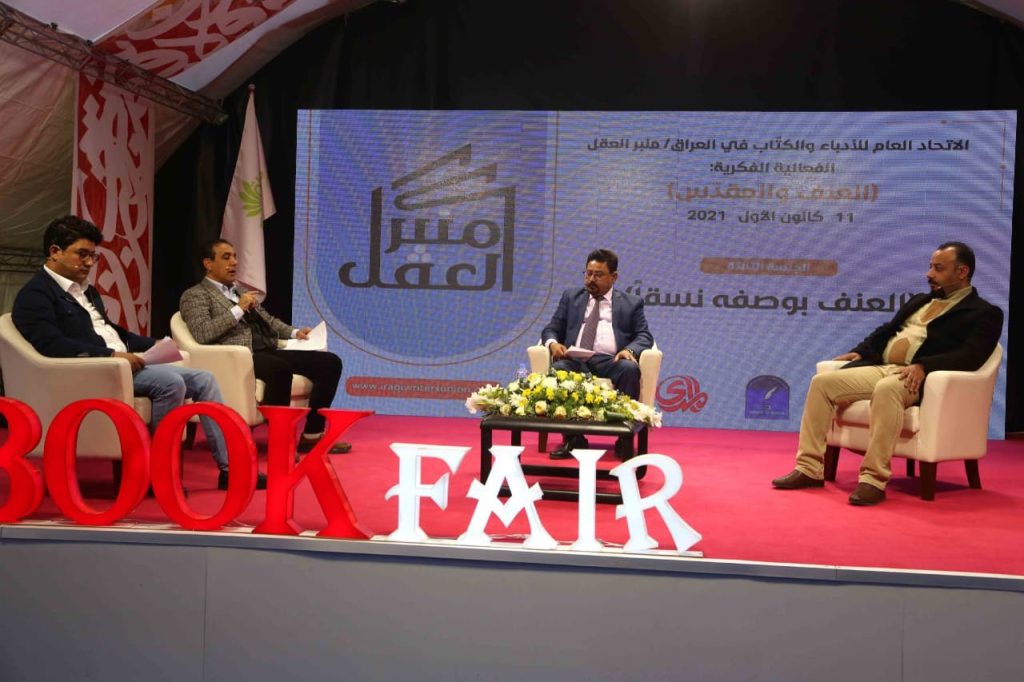
بسام عبد الرزاق
تصوير : محمود رؤوف
The Pulpit of the Mind of the General Union of Writers and Writers in Iraq concluded its last session at the Iraq International Book Fair with a session on “Violence as a System”, during which it reviewed the concept of the sacred and its link to several aspects, and what are the ethics of sacred violence and the employment of sacred violence and violence as a system.
The session was attended by professors Dr. Anfal Jassim, Dr. Loay Khazal and Dr. Aqeel Habib, while it was moderated by Dr. Kamal Al-Khailani.
At the beginning of the session, Dr. Aqeel Habib mentioned some observations through its psychological dimension, in connection with the sacred and violence, noting that “through my actual work and master’s and doctoral studies, I worked on samples that reached 200 people convicted of terrorism, and we chose a sample of three cases to work on as a clinical sample (clinical psychology) and through follow-up I found that the subject of violence was not rooted, whether in terms of human sciences or in terms of psychology.”
He added that “in terms of social sciences, no science of science specialized in the phenomenon of violence, which is an ancient human and historical phenomenon, violence and terrorism after 2003 changed the way the world thinks cultural and cognitive, and in psychology when we tried to study the phenomenon of terrorism and violence we found criminal psychology only, which is not specialized in terrorism.”
During his intervention, Habib presented an analysis of the speech of the leader of the terrorist organization “ISIS” Abu Bakr al-Baghdadi, which he delivered at the Great Mosque of Al-Nouri and its references that have psychological roots that enter into our culture and the symbolic structures that we learned in our social upbringing.
For his part, Dr. Anfal Jassim said that “the term sacred enters into a linguistic game, according to users, there are those who use it in a spontaneous way, which is the simple person, and there are those who use it with scientific dimensions and some of them are ideological and look at the sacred as a subject, but the simple man looks at him as a case he lives,” noting that “the world and the theorist and sometimes the ideologue looks at this topic as a study, the sociologist looks at the sacred as a case of study and when he studies it is outside the perspective of the sacred and looks at him with relations restricted to the state of the sacred religion, and the matter The other is seen as a stage in the development of the human mind, and this vision may contribute to an increase in violence on the other side and those who are the general public.”
He pointed out that “the sacred does not necessarily have to be religious, it is everything that provides you with energy and makes you feel strong, and if this sacred is multiple, it will reduce violence.”
Dr. Louay Khazal said that “linking and referring sacred violence becomes arbitrary if it goes to religion, and I think it is an arbitrary link, which refers to the popular mentality that violence is linked to the religious aspect, with violence being a social human practice that may employ religious or non-religious statements.”
He pointed out that “I tend to the definition that religion is a doctrine of thought and reason shared by a certain group and provides and provides a framework for orientation and philosophy and a subject of worship, sanctification and sincerity, which may be a god or philosophy or leader or may be the self,” noting that “violence is all sacred violence, acquires its holiness sometimes from the holiness of God or the state or ideology or self, and we must dismantle this interdependence.”
He continued that “the concept of symbolic violence says that society itself is a space of differentiation and disparities in power, and to maintain these disparities comes the establishment of violence, and we are working to find a value system so that we think from within this system to perpetuate these dominances and tensions, and this comes from a deeper issue, which is the destructive tendency, as human nature is not as it was prevalent, man in which either good or evil, man is a possibility in which the ability to be good or evil according to Certain weights exist in the social and political environment
